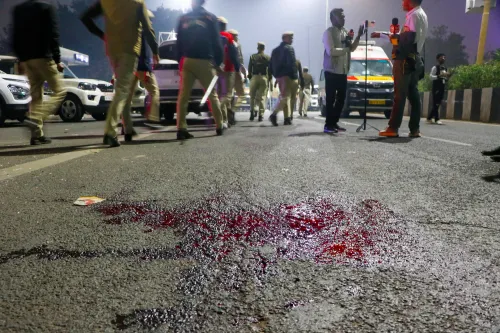Are Two Young Radicalised Alleged Assassins Now Facing US Courts in Politically-Charged Cases?

Synopsis
Key Takeaways
- Two alleged assassins face serious charges in US courts.
- Political violence is a growing concern in America.
- The death penalty may be pursued in some cases.
- Radicalisation of youth represents a troubling trend.
- Public support for legal defence can be significant.
New York, Sept 17 (NationPress) Two young radicalised alleged assassins have made their appearance in US courts amid growing concerns over political violence across the nation.
Tyler Robinson, aged 22, appeared remotely in a local court in Utah to answer charges related to the murder of Charlie Kirk, a prominent supporter of US President Donald Trump, last week.
He faces serious allegations of killing the Conservative youth activist, with prosecutors indicating their intention to pursue the death penalty, which can be executed by a firing squad in Utah.
In a separate case in New York, a judge dismissed terrorism charges against Luigi Mangione, aged 27, who is accused of murdering a health insurance CEO last year, although murder charges remain.
New York State does not enforce the death penalty.
Mangione has become a focal point for public outrage against health insurance companies, prompting his supporters to rally outside the courthouse in protest of his prosecution.
A legal defence fund for Mangione has reportedly raised over $1 million from public donations.
He allegedly shot and killed United Healthcare CEO Brian Thompson in downtown New York City last December, expressing grievances against “parasitical” health companies driven solely by profit in a manifesto.
Both Robinson and Mangione will also be facing charges in federal court, where they could potentially face the death penalty.
The US operates with both federal and state justice systems, leading to variations in laws and penalties.
Prosecutors revealed that Robinson's mother recognized him from circulated images of the suspect in Kirk's murder and alerted his father, who confronted him and facilitated his surrender.
They noted that Robinson confessed to the shooting in messages to his roommate, a person transitioning to woman.
Ironically, he claimed he acted against Kirk because he believed the victim “spreads too much hate,” as stated by officials.
Kirk's murder marks the latest incident in a troubling trend of violence with either political or similar undertones in the US, particularly involving radicalised young individuals.
Last year, Thomas Matthew Crooks, aged 20, attempted to assassinate President Trump during his campaign in Pennsylvania.
While Trump sustained injuries, another individual lost their life, and Crooks was subsequently shot by a Secret Service agent.
Another assassination attempt, which occurred last year by an older individual, was thwarted in Florida, and that trial commenced last week.
In an unrelated incident last month, Robin Westman, a 23-year-old transgender female, tragically killed two children and injured 18 others during a school-related event at a Minneapolis church before taking her own life.
In July, Shane Tamura, 27, killed four people in a New York building housing the National Football League before committing suicide, claiming brain injuries from playing American football led him to blame the league for his trauma.
In June, Vance Boelter, 57, allegedly took the lives of former Minnesota House of Representatives Speaker Emerita Melissa Hortman and her husband.
Pennsylvania Governor Josh Shapiro narrowly escaped an assassination attempt by Cody Balmer, 38, who allegedly set fire to his official residence in April.









